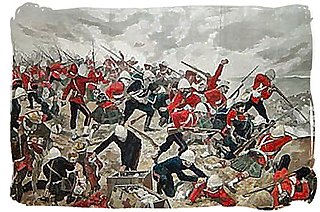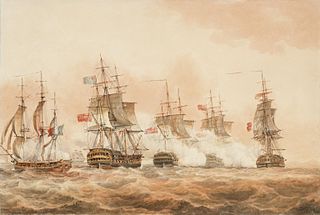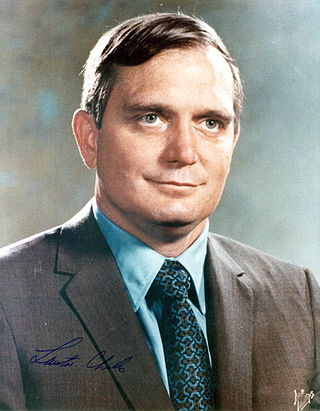This article relies largely or entirely on a single source .(March 2019) |
| |||||
| Decades: | |||||
|---|---|---|---|---|---|
| See also: | |||||
The following lists events that happened during 1906 in Chile.
This article relies largely or entirely on a single source .(March 2019) |
| |||||
| Decades: | |||||
|---|---|---|---|---|---|
| See also: | |||||
The following lists events that happened during 1906 in Chile.

Chile, officially the Republic of Chile, is a country in western South America. It is the southernmost country in the world and the closest to Antarctica, stretching along a narrow strip of land between the Andes Mountains and the Pacific Ocean. Chile had a population of 17.5 million as of the latest census in 2017 and has a territorial area of 756,102 square kilometers (291,933 sq mi), sharing borders with Peru to the north, Bolivia to the northeast, Argentina to the east, and the Drake Passage to the south. The country also controls several Pacific islands, including Juan Fernández, Isla Salas y Gómez, Desventuradas, and Easter Island, and claims about 1,250,000 square kilometers (480,000 sq mi) of Antarctica as the Chilean Antarctic Territory. The capital and largest city of Chile is Santiago, and the national language is Spanish.

Chile's government is a representative democratic republic, whereby the President of Chile is both head of state and head of government, and of a formal multi-party system. Executive power is exercised by the president and by their cabinet. Legislative power is vested in both the government and the two chambers of the National Congress. The judiciary is independent of the executive and the legislature of Chile.

1818 (MDCCCXVIII) was a common year starting on Thursday of the Gregorian calendar and a common year starting on Tuesday of the Julian calendar, the 1818th year of the Common Era (CE) and Anno Domini (AD) designations, the 818th year of the 2nd millennium, the 18th year of the 19th century, and the 9th year of the 1810s decade. As of the start of 1818, the Gregorian calendar was 12 days ahead of the Julian calendar, which remained in localized use until 1923.
1906 (MCMVI) was a common year starting on Monday of the Gregorian calendar and a common year starting on Sunday of the Julian calendar, the 1906th year of the Common Era (CE) and Anno Domini (AD) designations, the 906th year of the 2nd millennium, the 6th year of the 20th century, and the 7th year of the 1900s decade. As of the start of 1906, the Gregorian calendar was 13 days ahead of the Julian calendar, which remained in localized use until 1923.

1881 (MDCCCLXXXI) was a common year starting on Saturday of the Gregorian calendar and a common year starting on Thursday of the Julian calendar, the 1881st year of the Common Era (CE) and Anno Domini (AD) designations, the 881st year of the 2nd millennium, the 81st year of the 19th century, and the 2nd year of the 1880s decade. As of the start of 1881, the Gregorian calendar was 12 days ahead of the Julian calendar, which remained in localized use until 1923.

1814 (MDCCCXIV) was a common year starting on Saturday of the Gregorian calendar and a common year starting on Thursday of the Julian calendar, the 1814th year of the Common Era (CE) and Anno Domini (AD) designations, the 814th year of the 2nd millennium, the 14th year of the 19th century, and the 5th year of the 1810s decade. As of the start of 1814, the Gregorian calendar was 12 days ahead of the Julian calendar, which remained in localized use until 1923.
1843 (MDCCCXLIII) was a common year starting on Sunday of the Gregorian calendar and a common year starting on Friday of the Julian calendar, the 1843rd year of the Common Era (CE) and Anno Domini (AD) designations, the 843rd year of the 2nd millennium, the 43rd year of the 19th century, and the 4th year of the 1840s decade. As of the start of 1843, the Gregorian calendar was 12 days ahead of the Julian calendar, which remained in localized use until 1923.

1832 (MDCCCXXXII) was a leap year starting on Sunday of the Gregorian calendar and a leap year starting on Friday of the Julian calendar, the 1832nd year of the Common Era (CE) and Anno Domini (AD) designations, the 832nd year of the 2nd millennium, the 32nd year of the 19th century, and the 3rd year of the 1830s decade. As of the start of 1832, the Gregorian calendar was 12 days ahead of the Julian calendar, which remained in localized use until 1923.

1811 (MDCCCXI) was a common year starting on Tuesday of the Gregorian calendar and a common year starting on Sunday of the Julian calendar, the 1811th year of the Common Era (CE) and Anno Domini (AD) designations, the 811th year of the 2nd millennium, the 11th year of the 19th century, and the 2nd year of the 1810s decade. As of the start of 1811, the Gregorian calendar was 12 days ahead of the Julian calendar, which remained in localized use until 1923.

1651 (MDCLI) was a common year starting on Sunday of the Gregorian calendar and a common year starting on Wednesday of the Julian calendar, the 1651st year of the Common Era (CE) and Anno Domini (AD) designations, the 651st year of the 2nd millennium, the 51st year of the 17th century, and the 2nd year of the 1650s decade. As of the start of 1651, the Gregorian calendar was 10 days ahead of the Julian calendar, which remained in localized use until 1923.

Lawton Mainor Chiles Jr. was an American politician and military officer. A member of the Democratic Party, he served as a United States senator from Florida from 1971 to 1989 and as the 41st governor of Florida from 1991 until his death in 1998.

Augusto José Ramón Pinochet Ugarte was a Chilean army officer and military dictator who ruled Chile from 1973 to 1990. He was the leader of the military junta from 1973 to 1981, and was declared President of the Republic by the junta in 1974 and thus became the dictator of Chile, and from 1981 to 1990 as de jure president after a new constitution which confirmed him in the office was approved by a referendum in 1980. His time in office remains the longest of any Chilean ruler.

The 1906 Valparaíso earthquake hit Valparaíso, Chile, on August 16 at 19:55 local time. Its epicenter was offshore from the Valparaíso Region, and its magnitude was estimated at 8.2 Mw. This earthquake occurred thirty minutes after the 1906 Aleutian Islands earthquake.

Arturo Torres Carrasco was a Chilean football midfielder. He was part of Chile's team at the 1928 Summer Olympics.

Carlos Arturo Lett was an Argentine footballer who played as forward. Lett played most of his career in Alumni and the Argentina national team.
The following lists events that happened during 1887 in Chile.
The following lists events that happened during 1910 in Chile.
Events from the year 1906 in Russia.
The following lists events that happened during 1906 in the Kingdom of Belgium.

The Observatorio Manuel Foster, or Manuel Foster Observatory, is an astronomical observatory constructed on Cerro San Cristóbal near Santiago, Chile in 1903. This site was originally known as the D. O. Mills Observatory after the philanthropist Darius Ogden Mills. It was built as an offshoot of the Lick Observatory to observe stars in the southern hemisphere, and, under the direction of the American astronomer W. W. Campbell, was used in an extensive project to determine the apex of the Sun's motion through space.